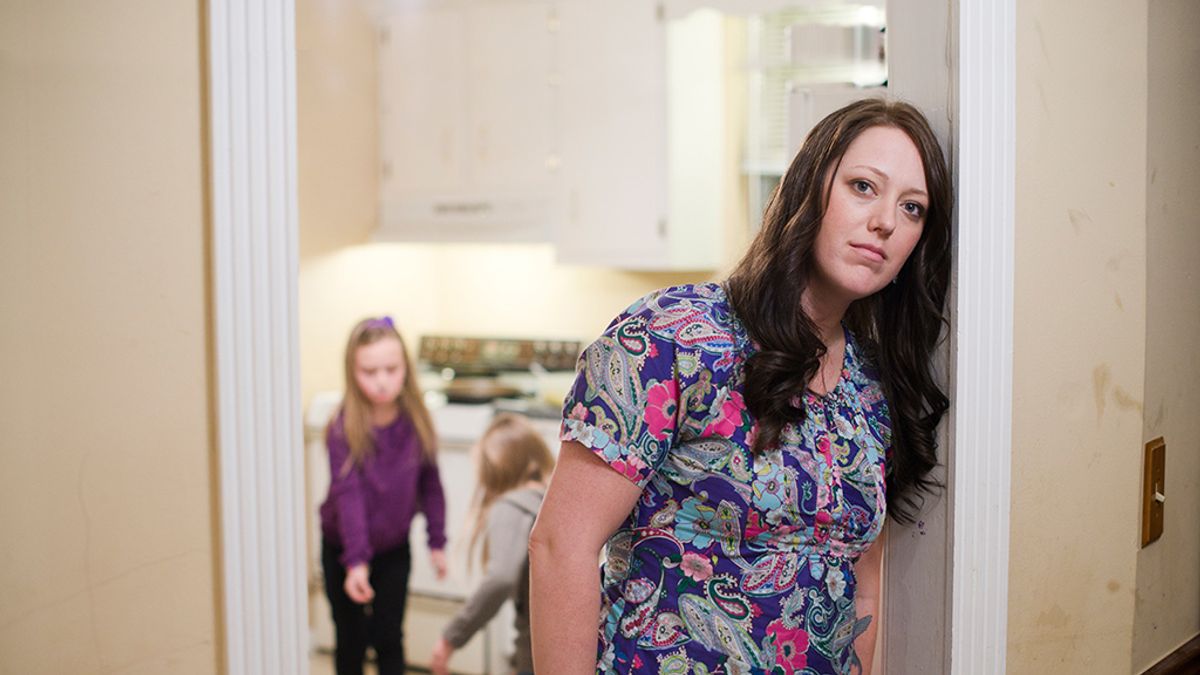Last week Bill Moyers and his band of merry truthsayers issued a staggering report: Bonuses allotted by firms on Wall Street in 2013 could "cover the cost of more than doubling the paychecks for all of the 1,085,000 Americans who work full-time at the current federal minimum wage of $7.25 per hour.” Even more alarming is the reality that millions of Americans are still living paycheck to paycheck. And while President Obama has signed an executive order raising the minimum wage for employees under federal contracts to $10.10 an hour, Congress continues to drag its feet on wage increases nationwide. "Paycheck to Paycheck: The Life and Times of Katrina Gilbert," a new HBO documentary that premieres Monday at 9:00 p.m. EST, reveals the consequences of such inaction -- and the disproportionate burden it places on women and children.
As its title suggests, the documentary centers on Katrina Gilbert, a single mother of three in her early thirties from Chattanooga, Tenn., scraping by as a Certified Nursing Assistant (CNA) at $9.49 per hour. In an ironic twist, Gilbert is employed to care for aging residents in a nursing facility and can barely care for herself or her children. “I feel a lot of women are going through the same thing," she responds when asked why she believes her story will resonate. "I’m just one of them.”
Statistics appear to bear out her claim. According to a report by the film’s executive producer, Maria Shriver, one in three women lives in poverty or on the brink of poverty, while 42 million women lead households, often without a partner, to care for 28 million children across the country. Most women work without paid sick days, job security or affordable child care.
What makes Gilbert's story so compelling is that she challenges almost every stereotype underpinning right-wing rhetoric about poverty, single mothers and the underemployed. Gilbert isn't looking for a government "handout," and she doesn't blame others for her plight. She's also remarkably patient and affectionate with her children, even as she raises them by herself. (As we learn, a significant portion of her childcare burden is relieved by the Chambliss Center , a 24-hour, seven-day-a-week childcare facility that offers a range of educational and counseling services for low-income families on a sliding scale. “If it wasn’t for them," Katrina declares, "I wouldn’t be able to work because I would just be paying for daycare. How would you pay your bills? It’s impossible.")
Gilbert's tale also offers a refreshing reminder to conservative politicians that economic hardship is not the exclusive domain of ethnic minorities. Like Monica Potts' illuminating feature in The American Prospect, “What’s Killing Poor White Women,” "Paycheck to Paycheck" explores the complex texture of inequality -- and examines why white women are an oft-ignored face of poverty in modern America.
Adopting an ethnographic approach, filmmakers Shari Cookson and Nick Doob acknowledge intimacy as implicit to the process of documentary film and reject the notion of isolation from the film’s subject. As in their relationship with Gilbert and her children, they believe trust and understanding are necessary between those in front of and behind the camera. The result is a beautiful, lilting portrait of a young mother walking the line between have and have not. “[Doing] a film about poverty is kind of daunting," Doob tells Salon. Adds Cookson: "It’s a gigantic subject and there’s ten million ways you could come at it. What we’re trying to do is engage the viewer in somebody’s life.”
Since the documentary's completion, some nuggets of good fortune have found Katrina Gilbert: She's gotten engaged to her boyfriend and has the opportunity to continue her education with a scholarship to a local community college. Earlier this year, Gilbert was even invited to the White House to witness the signing of the executive order to raise minimum wage for federal workers. Although it won't affect her income, she believes it's a "step in the right direction."
"Paycheck to Paycheck: The Life and Times of Katrina Gilbert" will stream for free on HBO through March 24, and in an effort to encourage screening parties, Shriver has a created a special screening guide to facilitate action and discussion (more than 500 people and orgs have signed up already). American women continue to toil in poverty, paycheck to paycheck, but perhaps one woman's carefully documented story can help the unknown millions become a little more familiar.



Shares